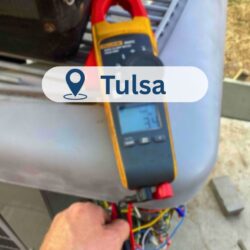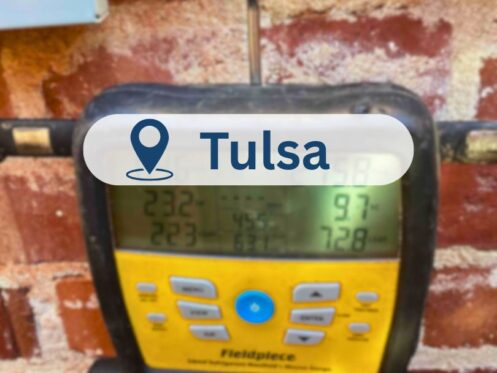Living in Tulsa, Oklahoma means dealing with hot, humid summers where your air conditioning system becomes the unsung hero of your home. So when your AC unit starts making strange noises, it’s not just annoying—it can be downright concerning. Unusual AC sounds are more than just a nuisance; they’re often your system’s way of signaling that something isn’t quite right.
Many Tulsa homeowners ignore these warning signs until their AC system completely fails, often during the peak of summer when temperatures soar above 95 degrees. Understanding what these noises mean could save you from uncomfortable indoor temperatures and potentially expensive emergency repairs. Addressing unusual AC noises and getting your AC Diagnosed promptly can extend your system’s lifespan and maintain its efficiency during Oklahoma’s challenging climate conditions.

Common AC Noises Tulsa Homeowners Experience
Tulsa’s climate puts unique demands on air conditioning systems, often resulting in distinctive noises that can indicate various problems. Recognizing these sounds is the first step toward effective AC repair and maintenance.
Banging and Clanking Sounds: When your AC produces loud metallic bangs or clanks, this typically indicates a problem with the compressor or blower assembly. In Tulsa’s summer heat, these components work overtime and may develop loose or broken parts. The compressor might have loose mounting bolts or internal components that have become detached, while fan blades could be hitting other components as they rotate.
Whistling or Hissing Noises: These high-pitched sounds often point to air pressure problems or refrigerant leaks. In Tulsa, where humidity levels fluctuate dramatically between seasons, pressure imbalances in your AC system are common. Whistling might come from dirty filters restricting airflow, while hissing typically suggests refrigerant is escaping from your system—a problem that not only affects performance but can also impact your home’s air quality.
Buzzing or Humming: Electrical components in your AC system might produce buzzing sounds when they’re failing. This is particularly common in older Tulsa homes where electrical systems may not be designed to handle modern high-efficiency AC units. Loose wiring, failing contactors, or struggling motors typically cause these noises, and they shouldn’t be ignored as they could indicate potential electrical hazards.
Rattling or Vibrating Sounds: Rattling noises often mean something has come loose within your AC unit. Tulsa’s seasonal temperature swings cause materials to expand and contract, which can loosen screws, bolts, or other fasteners over time. Additionally, the heavy thunderstorms common to Oklahoma can sometimes shift outdoor units slightly, creating alignment issues that lead to vibrations and rattling.
What Causes AC Noises in Tulsa Homes?
Weather-specific Impacts on AC Systems in Oklahoma: Tulsa experiences dramatic temperature fluctuations, from frigid winters to scorching summers with high humidity. These extreme changes force AC systems to work harder than in more moderate climates. The constant expansion and contraction of metal components during seasonal transitions can lead to fasteners loosening and parts becoming misaligned. Additionally, Tulsa’s famous thunderstorms can cause power surges that damage sensitive electronic components, resulting in buzzing or intermittent operation noises.
Dust and Pollen Considerations: Oklahoma’s agricultural surroundings and natural prairie landscape contribute to high levels of dust and pollen that can infiltrate AC systems. When these particles accumulate on fan blades, coils, or inside ductwork, they create resistance that forces motors to work harder. This extra strain often produces grinding or whining noises that worsen over time. Many Tulsa homeowners notice increased AC noise during spring when pollen counts are at their highest.
Age-related Wear and Tear: The average AC unit in Tulsa faces more operational hours than similar units in milder climates. Local HVAC technicians report that air conditioners in the Tulsa area often age faster due to extended running times during hot, humid summers. This accelerated aging process leads to bearing wear in motors, refrigerant pressure issues, and compressor problems—all of which create distinctive noises before complete failure occurs.
Poor Installation or Maintenance Issues: Unfortunately, not all AC installations in Tulsa are created equal. Systems that were improperly sized for Oklahoma’s climate demands or installed without accounting for local weather patterns often develop noise issues prematurely. Many homes built during Tulsa’s housing booms weren’t designed with modern air conditioning requirements in mind, leading to retrofitted systems that may not have optimal ductwork or proper vibration isolation.
A well-maintained AC unit should operate relatively quietly, with only a gentle humming during normal operation.
DIY Troubleshooting for Noisy Air Conditioners in Tulsa
Before calling us for AC repair services, you can perform some simple checks to potentially identify and resolve minor noise issues. These DIY steps might save you time and money, especially during peak summer months when you don’t want to wait
Check and Replace Air Filters: One of the most common causes of AC noise in Tulsa homes is clogged air filters. Oklahoma’s dusty conditions mean filters get dirty faster than manufacturer estimates suggest. When airflow is restricted, your system works harder and makes more noise. Inspect your filter monthly during summer and replace it when it appears dirty—not just on a predetermined schedule. This simple maintenance task can eliminate whistling noises and improve system efficiency.
Clean Around Outdoor Units: Tulsa’s abundant vegetation, particularly after spring rains, can quickly overtake outdoor AC units. Leaves, grass clippings, and debris can get pulled into the condenser coils or fan, creating rattling and buzzing sounds. Maintain at least two feet of clearance around your outdoor unit, and gently clean the exterior fins with a soft brush or the brush attachment on your vacuum cleaner. Never use pressure washers, which can damage delicate fins.
Tighten Visible Hardware: Oklahoma’s temperature swings and occasional seismic activity can gradually loosen mounting bolts and access panels on AC units. Using appropriate tools, check and gently tighten visible screws and bolts on your indoor air handler and outdoor condenser unit. Pay special attention to fan mounts and access panels, which commonly vibrate loose. Always turn off power to the unit at the breaker before performing this check.
Check Thermostat Settings: Sometimes what sounds like an AC problem is actually the system cycling on and off too frequently due to improper thermostat settings. This short-cycling creates unnecessary wear and distinctive starting noises. Ensure your thermostat is set to “auto” rather than “on,” and consider whether your temperature settings are realistic for Tulsa’s climate—setting your thermostat too low forces your system to run constantly.
When to Stop DIY Efforts: While these simple checks are safe for most homeowners, it’s important to recognize your limitations. If noises persist after these basic steps or if you notice oil stains, ice formation, or burning smells along with the noise, it’s time to give us a call. Additionally, any issues requiring refrigerant handling, electrical work, or disassembly of the unit should be left to one of our certified AC repair technicians familiar with Green Country’s specific climate challenges.
DIY troubleshooting can resolve minor issues, but many AC noises indicate problems that require professional attention. Knowing when to call for expert AC diagnostic services can prevent minor issues from becoming major repairs.
Many Tulsa homeowners hesitate to call for AC repair services due to concerns about cost. However, at American Home Pros, we emphasize that addressing strange noises immediately is almost always less expensive than waiting until complete failure occurs. A wire repair or capacitor might cost you $200-$300 while a full motor replacement can be more than $700 or more if the warning noises are ignored. During Tulsa’s peak summer heat, the additional cost of emergency service calls further increases this financial impact.
Professional AC diagnostic services can accurately identify the source of unusual noises and recommend appropriate repairs. However, choosing the right service provider is crucial for getting lasting results at a fair price.

